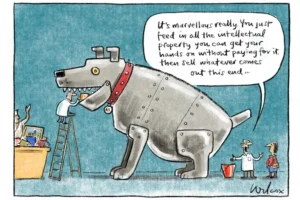
The Australian Taxation Office has outsourced thousands of call centre roles to private operators that pay workers significantly less than public servants and use call targets that can leave vulnerable taxpayers exposed, Guardian Australia can reveal.
The call centre contracts are shared between US private equity-owned Probe Operations, the Nasdaq-listed Concentrix Services and British multinational Serco and are collectively worth $316.5m, according to analysis of government tenders.
This is in addition to the ATO’s $42.8m worth of contracts with the private equity-owned debt collector Recoveriescorp.
The wide-ranging agreements show how reliant the government’s chief revenue collection agency is on for-profit contractors, which have become its de facto public-facing arm.
Consumer advocates have raised significant concerns over how the outsourced model is affecting vulnerable taxpayers amid a spike in complaints to the tax watchdog over the agency’s debt collection practices.
The Community and Public Sector Union deputy national president, Beth Vincent-Pietsch, said there were now about 2,000 workers at for-profit call centres performing ATO work.
“We know that while the workers receive lower pay and conditions than directly employed public servants, the cost to taxpayers of these private contracts is higher, and comes with considerably less transparency and accountability,” Vincent-Pietsch said.
Sign up: AU Breaking News email
“Australian taxpayers contacting the ATO understandably assume they are speaking with an ATO employee, but may unknowingly be speaking with a private contractor who is not a public servant and not covered by the code of conduct.”
She said call centre staff employed by the contractors were “set up to fail” given they do not have the same training and support of public sector employees.
While training guides for contract staff are organised by the ATO, it is routinely delivered by private contractors.
Call bonuses
Call centre staff at one of the private operators typically earn $26.70 an hour, which equates to an annual salary of about $52,800, according to a person with knowledge of its operations.
The rate is determined by the contract call centre award, which sets $26.70 for a level 2 clerical office worker.
The person said workers can increase their pay through meeting call handling targets, creating an incentive to keep calls short.
The person said all of the private contractors relied on the call centre award to pay a similar rate of pay, although the person does not have direct knowledge of their operations.
The external call centre staff fulfil numerous functions, which includes phone-based debt collection.
The contracts are based on the delivery of services rather than staffing levels, which the union says allows private operators to boost profits by having lower-paid staff take and make more calls, creating a potential conflict with the needs of vulnerable taxpayers who usually require longer conversations.
Probe, Serco and Concentrix declined to respond to questions about their pay rates and incentive structures. They directed all of Guardian Australia’s inquiries to the ATO.
The private contractor pay levels are significantly below the Australian public service (APS) rates, with the ATO’s directly employed call centre staff typically classified as an APS 3, according to the union.
This places direct ATO call centre employees on a base annual salary of between $72,900 and $78,700, or more than $20,000 more than those working for a private contractor.
Shadow workforce?
While the ATO has long used private contractors, they were originally intended as a way to manage busy periods, such as tax time, rather than a shadow workforce.
An ATO spokesperson declined to comment on the number of call centre staff used by the private contractors, and did not answer questions about bonuses and incentives used by Probe, Concentrix and Serco.
The spokesperson said the agency supplements its existing workforce with outsource contact centre providers to provide additional capability.
“The ATO currently engages external suppliers, including Serco, Concentrix and Probe, to deliver on a range of contact centre services including telephony (inbound and outbound), processing work and debt collection,” the spokesperson said.
“If, in the process of undertaking tax debt recovery actions, we identify that a taxpayer is experiencing vulnerable circumstances, all staff, including outsource contact centres, are expected to ensure appropriate support and assistance is provided.”
The ATO’s use of private contractors ramped up under recent Coalition governments, according to the public sector union.
It has not been unwound despite a directive by the Labor government in 2023 for all agencies to “move away from outsourcing work that is the core role of the APS or the agency”.
The large contracts with Probe, Concentrix and Serco took effect in 2024, well after the government directive. The contracts run until mid 2026, according to public tender information.
The ATO has signed repeat contracts with private debt collector Recoveriescorp since 2022, representing its first use of an external debt collector since before the pandemic.
More than 355,000 taxpayers have been referred to Recoveriescorp, including welfare recipients who have complained about the heavy-handed process.
A Recoveriescorp spokesperson said the debt collector was committed to treating all customers with respect and that its practices are in line with formal debt collection guidelines.
While the government banned Centrelink from using external debt collectors to chase welfare recipients over social security debts in the fallout of the robodebt scandal, the ATO can use them to pursue welfare recipients over alleged tax debts.
Dr Vivien Chen, senior lecturer at the Monash Business School, said the use of private debt collectors made bad situations worse.
“We know of people being pursued for tax debts who are experiencing vulnerability, including victim survivors of family violence who are coerced into tax debts as a result of financial abuse,” Chen said.
“Contact from debt collectors is stressful and aggravates the harm that victim survivors experience when fleeing violence.”





